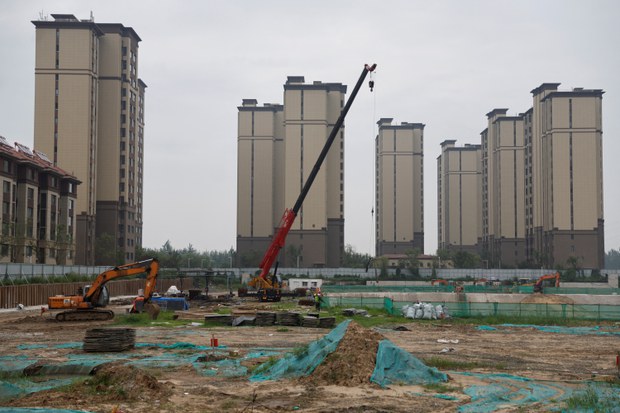China’s property market sees some relief amid protests
Share

A construction site of residential buildings by Chinese developer Country Garden is pictured in Tianjin, China August 18, 2023.
Embattled Chinese property giant Country Garden has paid two overdue bond-coupon payments, which some hailed as good news for the sector, as Beijing moved to stimulate buying by relaxing rules on mortgages.
The lowered down-payment thresholds on properties resulted in a surge in home buying in at least Shanghai and Beijing over the weekend but social media reports and circulated videos showed protests by frustrated investors countrywide.
The protests come as real estate companies default, public servants go unpaid and teachers go on strike, with authorities finding the costs of maintaining stability ever harder to meet.
Few economic observers consider that Beijing has the will to attempt to bail out a debt-ridden system built on property assets, despite the risks, with one government insider telling the British press on the condition of anonymity that Beijing was simply trying to stay in control rather than stimulate the stagnant property sector.
“The central government is well aware that the real estate sector will inevitably shrink,” the source said, adding that Beijing’s goal was to shift growth away from property and infrastructure development.
Economists and China experts all say it will be a massive challenge.
“China’s attempt to deal with $9 trillion of off balance sheet government debt is exacerbating the gap between wealthier coastal provinces and poorer ones in the interior and risks setting off economic contagion,” noted Dexter Roberts, director of China Affairs at the Maureen and Mike Mansfield Center, University of Montana.
Michael Pettis, senior fellow with the Carnegie Endowment agreed, calling it “an important but little-appreciated point.”
“The large gap between developed China and undeveloped China will expand dramatically as the economy slows and Beijing wrestles with debt,” he said. “I’m not sure what the political consequences will be, but there will be consequences.”
As for Country Garden’s last-minute reprieve on interest payments on U.S. bonds last week, Pettis wrote, “This of course prevents a default today, but repayment still ultimately requires a revived property market, which few expect and Beijing doesn’t want.”
It’s widely considered that Beijing doesn’t only not want to revive the property sector; it can’t. The money is simply not there to do a repeat of the 2008 global financial crisis bailout, with local governments and the massive real estate sector saddled with debt and developers on the verge of total collapse.
The specter of unrest
Speaking to RFA Mandarin, Laurence Wu, associate professor of the General Education Center at Taipei Marine Technology University, said that the Chinese public was becoming increasingly less patient in the face of continued economic hardship and financial losses.
“In the past, the public were somewhat ‘sheeplike,’ keeping their heads down as long as they were allowed to graze,” Wu said.
Recalling the Henan Province banking crisis in 2017, involving unfinished housing projects, frozen bank accounts and mortgage strikes, Wu said most of those affected quieted down after the government purged some token officials.
“Now, with [all of] China’s economy facing challenges, the slightest disturbance quickly sparks public resistance,” he said.
On Monday, a video circulating on Chinese social media showed investors protesting outside the headquarters of the Zhongzhi Group in Beijing being attacked by what appeared to be security personnel dressed in white who were holding white boards the size of police shields, trying to block people from filming the protest scene.
Zhongzhi Enterprise Group, China’s largest private financial holding conglomerate, is conservatively estimated to have defaulted on U.S.$54.3 billion due to real estate investments.
Those most affected by Zhongzhi shortfalls of liquidity are high-net-worth clients and businesses, including 150,000 individual investors and nearly 5,000 companies.
A Zhongzhi representative reached by RFA Mandarin declined to comment, claiming “I don’t have the authority to answer you,” before hanging up.
Enter nationalism
As further videos circulated Monday showing protests in the central province of Henan and in Xi’an in Shaanxi Province, both involving failed real estate companies and investors who have lost their money, Chinese President Xi Jinping is likely to fall back on nationalism, a reliable Chinese Communist Party crutch.
As everyone from tech billionaires to bankers and the masses are called upon to learn from Xi Jinping Thought, in a reminder of China’s Maoist past, Xi demands complete loyalty to himself and to the party.
In a recent interview, Chun Han Wong, author of “Party of One: The Rise of Xi Jinping and China’s Superpower Future,” said that Xi’s all-controlling projection of power is his weakness.
“Whereas Mao Zedong and Deng Xiaoping enjoyed prestige from their revolutionary pedigree and exploits in establishing the ‘New China,’ Xi has no personal legitimacy independent of the Communist Party,” the author said.
Edited by Mike Firn and Taejun Kang.







